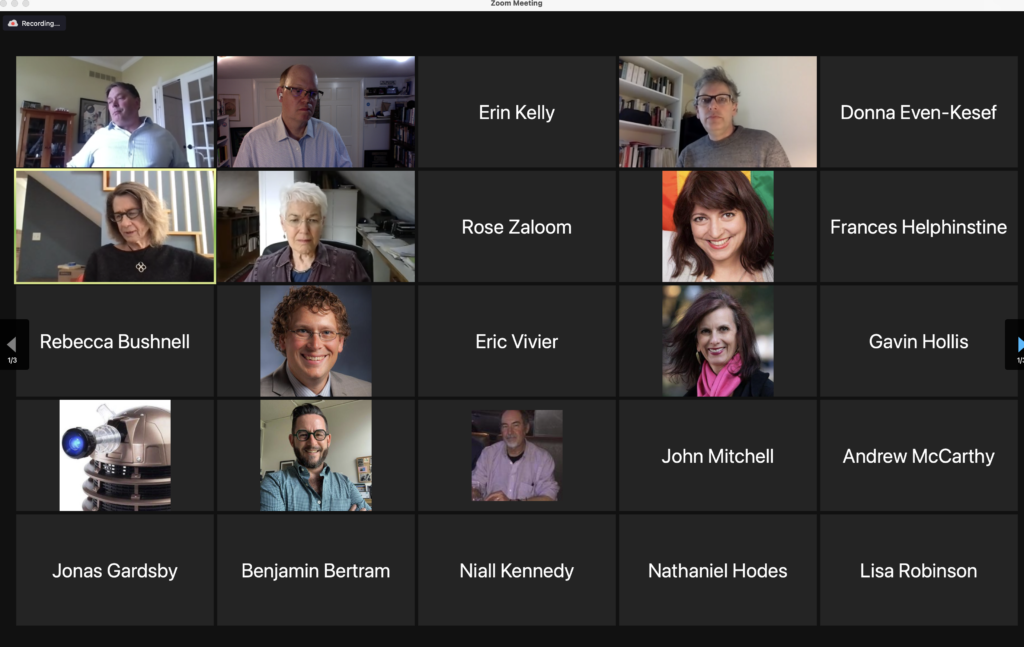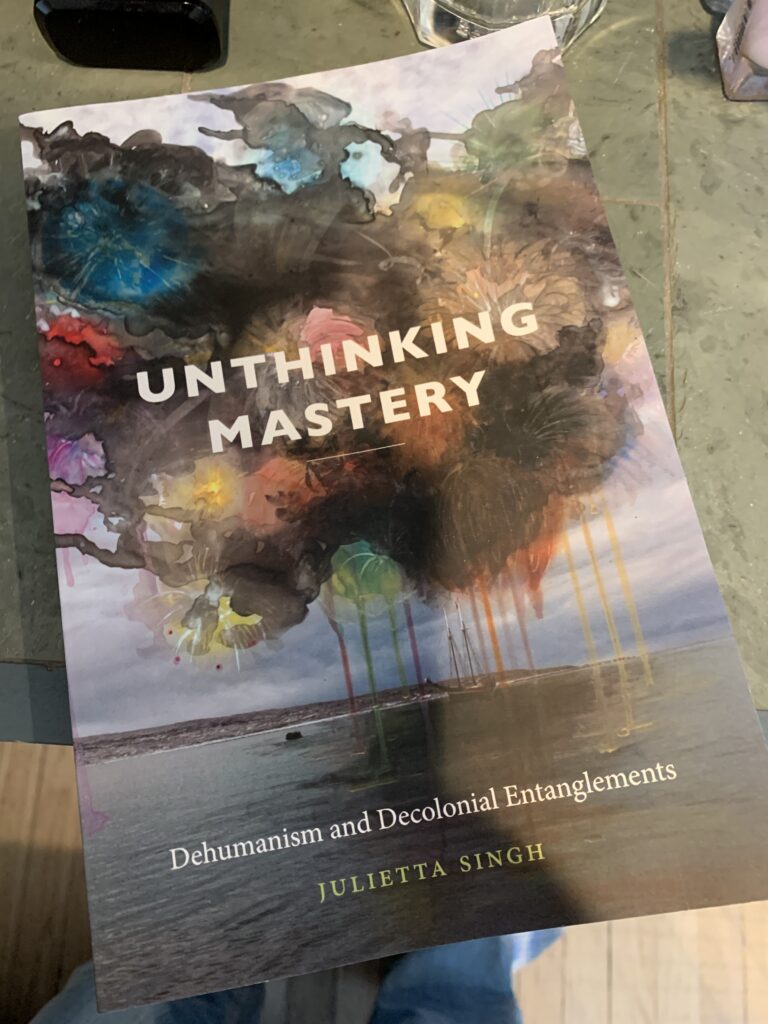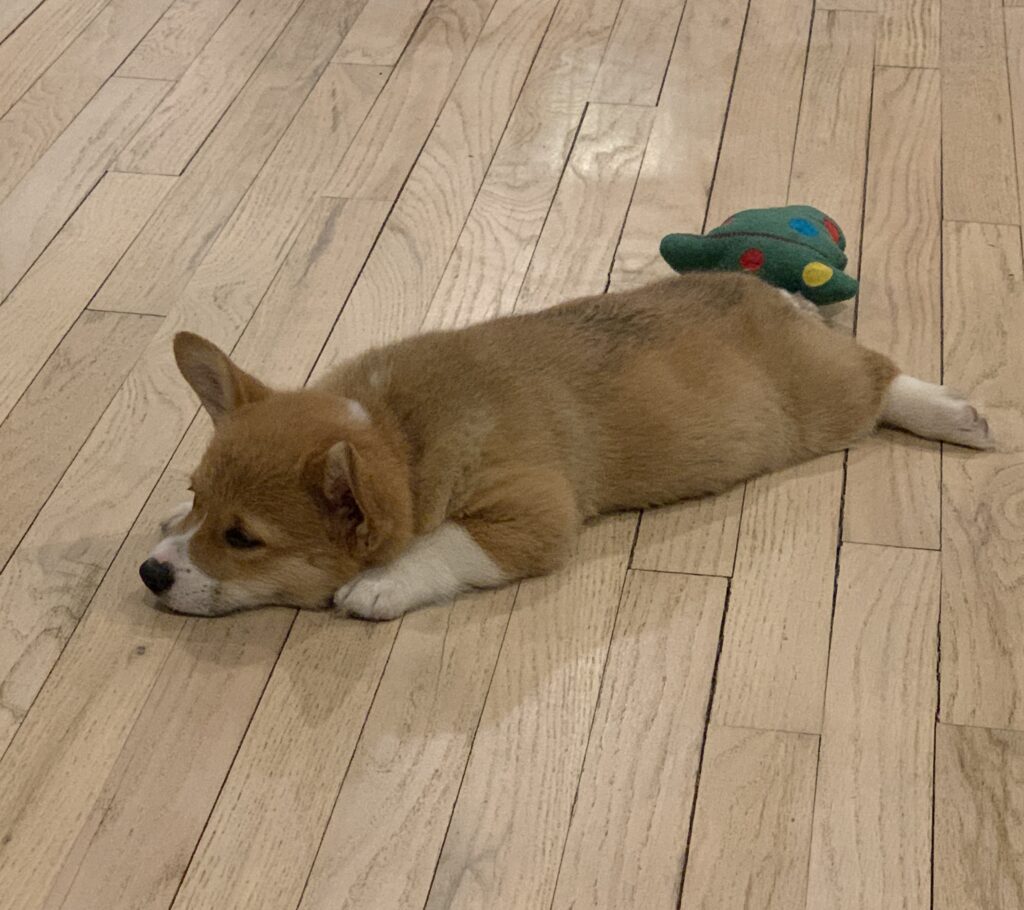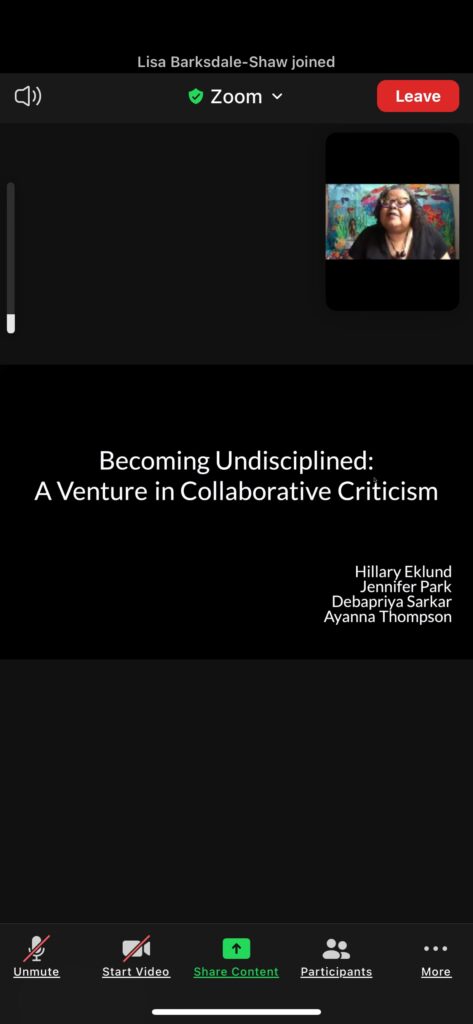I closed out of the dazzling #NextGenPlen while standing at my sink washing dishes.
I listened to the experimental genius of “Becoming Undisciplined,” the Eco-Race crossover panel organized by Hillary Eklund and Debapriya Sarkar, featuring Jennifer Park, Ayanna Thompson, and Kim Hall as chair, while tromping squishy paths through the woods in coastal Connecticut’s mud season.

I caught (most of) many other sessions, including the inspiring “Walk the Talk” pedagogy session, Keith Hamilton Cobb’s roundtable on American Moor, and the quite moving three-headed talks by our Pandemic Presidents, with lots of help from my household’s four-legged friends, including Blue, a 9 week old puppy who needs to go outside pretty much all the time, and Indi, a 2-year old big dog who doesn’t want Blue hogging all the attention. (Among other things, I figured out exactly where in my yard the home wifi cuts out!)
I was more responsible in my roles in the two sessions I had speaking parts in. I did sneak Blue onto the Zoom-screen for a (requested) cameo during the generous and generative Workshop in Poetics and Pedagogy organized by Joanne Diaz, which was my primary contribution in #shax2021. When I chaired the “Shakespeare’s Witness to Catastrophe” panel, organized by Erin Kelly & featuring great talks by Julian Yates, Craig Dionne, and Sharon O’Dair, I was as professional as Zoom enables — neither puppies nor hiking boots! (No shoes at all, actually.)

There’s a strange and distinctive mental exhaustion that follows SAA each year, one that I usually process while on a late-night or red eye flight, often nursing a multi-day hangover that I was better at ignoring during the former century. This year’s Zoomlandia edition of #shax20201 made me miss the chance encounters, over-long Starbucks lines, and early morning walks in unfamiliar cities. I especially missed Austin, both its breakfast tacos and the cool waters of Barton Springs. But I wonder — are there things to value, to preserve, even to love about Zoom-SAA?

Two utopian visions swirled around my imagination as I listened to extraordinary academic talks while walking the dogs —
- This year’s program, which its emphases on pedagogy and social justice, created more perhaps than any previous conference an SAA that’s about the worlds in which most of us teach — worlds that are brilliant and also compromised, rewarding and also confining. Perhaps because the Zoom-verse is the only place I’ve been teaching for the past 12 months, inhabiting the Hollywood Squares with my SAA buddies felt more closely connected to my teaching self than it sometimes does. And not only bc it turns out that SAA-ers, like my students, often mute their videos so I’m standing in my house talking at a sea of empty boxes!
- Secondly, this year’s SAA was the only one I’ve gone to, in an SAA history of regular attendance since the mid-1990s, in which I caught a decent amount of the SAA experience without ditching my family care duties on Easter weekend. I won’t say I wasn’t sometimes distracted, washing dishes with Shax-brilliance in my earbuds. But I wasn’t absent — and too often in the past I have been.
I’m pretty sure in the end neither of these visions will lead me to future Zoom-tastic events, at least not for SAA, my personal mothership of academic conferences. But there are, I think, some things we can learn from our shipwreck onto the Island of Zoom.

A book I need to read
One event that I missed because of family duties was the Town Hall, since I couldn’t manage jamboard + BreakOutRoom while chasing the puppy and cooking dinner. I don’t have deeply-considered thoughts about the Luncheon (which I usually go to) or the Dance (which I’ve never attended, probably bc I’m too dorky and/or self-conscious). But I do have some thoughts about how to help the SAA adapt to the 21st century, which I’ll drop quickly here —
- The Board of Trustees should double or maybe even triple in size, with dedicated spots reserved for grad students, Early Career Researchers, and NTT faculty. Maybe also there should be closer attention to geographical equity. The extra capacity on the Board might focus at least in part on increasing transparency and communication with the membership. I love all the recent initiatives and collaborations too, esp with teachers and performers.
- The current two-phase review of the Program, in which the Program Committee spends months and hours recruiting panels and seminars, a significant percentage of which are later rejected by the Board, should be streamlined. There’s no reason not to trust the Program Committee to finish the job itself. Maybe more Board members could work on the Program Committee, but I’d trust the Committee to create the Program.
To be clear, I don’t mean in either of these suggestions to criticize Boards or Programs past or present; all current and past Board members are Shakespeareans whom I admire and respect. I’m trying to think about how to enable the SAA to best deal with the increasing size and professional diversity of our community. I think we can be more representative than we currently are, especially of members without research-intensive faculty positions. I also think we’ve been moving in that direction recently in visible and productive ways.
But those are just my thoughts, which no one needs to listen to!

The things I most loved about this year’s program were the visible efforts to engage with pedagogies of social justice, and also to bring together discourses in our research that are too often separate. At our best, I think we managed to do those two things at the same time, but I’ll think about them one at a time.
First, pedagogy – this year was my first (and so far only, I must admit) year that my main event was a Workshop on pedagogy, organized by Joanne Diaz. I wasn’t exactly sure what to expect. I knew fewer of the participants than I am used to in SAA sessions, since I mostly attend eco-seminars populated by the usual eco-suspects, most of whom I have known for years. Joanne gave our group pretty open prompts to write about how we teach close reading in today’s classrooms, and the dozen of us circulated a wide and stimulating array of tricks, tropes, and techniques that will influence my classroom practice starting — well probably starting tomorrow, actually. But what was especially moving about this workshop-seminar was the sense of shared endeavor, of mutual support and exchange. I’ve never before had a spontaneous Google Doc appear during an SAA session, so that we could share ideas and notes beyond the session. I was also touched by how eager everyone was to stay after the two hours traffic of our session to continue exchanging ideas. It’s a Zoom-cliche to encourage our pets to gate-crash our screens, I suppose, but I enjoyed bringing my little Blue to the session, as well as seeing many other kitties. Alas for the after-conversation at the hotel bar or over Austin’s famous tacos! I hope this group can re-assemble in Jacksonville for an in-person visit.
Second, on the subject of bringing Shax discourses together, I’ve rarely been so inspired by any SAA presentation as by the “Becoming Undisciplined” panel that entangled ecocriticism and Premodern Critical Race Theory. I’ve been hoping to see more of that kind of overlap since the double plenary panels at #shakeass2017 that mashed up Queer Ecocrit with the Color of Membership. That memorable morning in shakenado-distressed Atlanta the eco panel was the warm-up act to the PCRS headliner. This year in e-Austin the two discourses merged, as all four presentations combined into a single flowing exchange of ideas, hopes, and imagined futures.
My strongest impression from this year’s “Becoming Undisciplined” panel was its emphasis on “unlearning” as well as learning, on entering into unfamiliar discourses with humility and generosity, and advocating a collective rejection of the will-to-mastery that structures both the white settler colonialism of American history and, more narrowly, the academic discourse of Shakespeare studies. None of us can do it all ourselves, each of us will likely make mistakes, but in collaboration new things can happen. To be a sympathetic, albeit dispersed Zoom-audience at this great panel, as at the blazing Whiteness panel or the Witness to Catastrophe eco-panel that I chaired on the first day of SAA, was, from afar and in strangely mediated solitude, to imagine collectively, to enter into the project of learning and unlearning with which Hillary Eklund, Debapriya Sarkar, and Jennifer Park approached this discursive crossing, and also to follow the visionary leadership of Ayanna Thompson and Kim Hall. At the risk of sounding too Shax-normie (which I am), it reminded me of those epilogue moments, when Puck, Rosalind, Prospero, or King Henry’s Chorus enjoins us to give our hands. “Let your indulgence,” says the bad man, “set me free.” I have no illusion that the joining of hands and indulgences can redeem the colonialism and racism that my white flesh is heir to, nor that my engagement with the work of my colleagues gets me out of doing the hard work myself. But there are collective moments in collective events at which glimpses of better worlds appear. I caught a few of them this year, on Zoom.

There’s much more I could say about #shax2021, about the moving and speculative eco-session I chaired on the first day and the lively still-going conversations it generated, about the fire and inspiration of the “White World-Making” panel organized by Arthur Little, about the SAA-closing (for non-dancers like me) genius of the #NextGenPlen, with its brilliant tiny papers and expansive, generous conversation. So much to overfill my e-cup!
As spring springs slowly in the chilly Northeastern USA, and my own pandemic practices begin to thaw as well (I’m #teamModerna, so I have to wait an extra week for my second dose), I’ve been thinking about what practices and habits I’d like to keep as quarantine ends. I’m hopeful about short daily meditations and black coffee at dawn, which the new puppy’s enthusiasm has disrupted but not entirely derailed. I want to keep thinking about access, both for students and conference goers, though I also very much hope to go places in person sometime fairly soon. In a way the enforced e-discourse, which has made it as easy to communicate with colleagues in Europe and Australia as New York and Massachusetts, has opened my horizons, including beyond early modern studies. But for my #shaxbudies I am greatly looking forward to celebrating 50 years of SAA in Florida next spring.
After the vax, Shax in Jax! (To borrow a triplet from LIza Blake on Facebook this morning.)
A pleasiure to e-see those few of you who I managed to e-connect with — and for everyone else, I’ll see you at the hotel bar, local beaches, fishing boats, or riverwalk cafes next year!